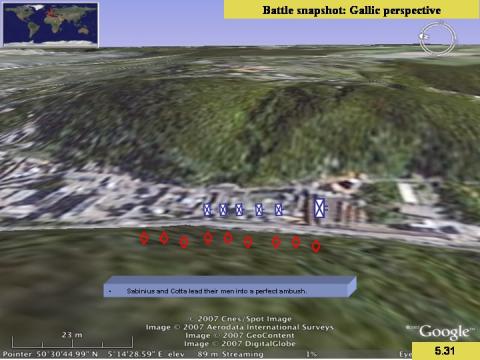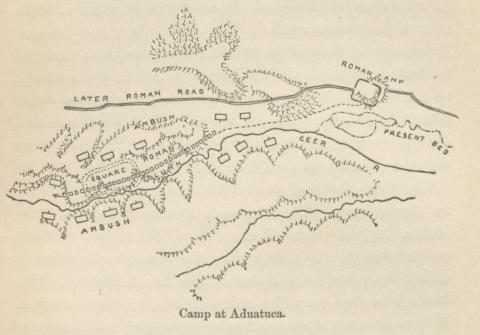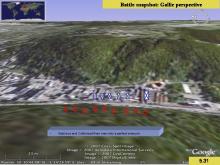Cōnsurgitur ex cōnsiliō; comprehendunt utrumque et ōrant nē suā dissēnsiōne et pertināciā rem in summum perīculum dēdūcant: facilem esse rem, seu maneant, seu proficīscantur, sī modo ūnum omnēs sentiant āc probent; contrā in dissēnsiōne nūllam sē salūtem perspicere. Rēs disputātiōne ad mediam noctem perdūcitur. Tandem dat Cotta permōtus manūs: superat sententia Sabīnī. Prōnūntiātur prīmā lūce itūrōs. Cōnsūmitur vigiliīs reliqua pars noctis, cum sua quisque mīles circumspiceret, quid sēcum portāre posset, quid ex īnstrūmentō hībernōrum relinquere cōgerētur. Omnia excōgitantur, quārē nec sine perīculō maneātur et languōre mīlitum et vigiliīs perīculum augeātur. Prīmā lūce sīc ex castrīs proficīscuntur ut quibus esset persuāsum nōn ab hoste sed ab homine amīcissimō Ambiorige cōnsilium datum, longissimō āgmine māximīsque impedīmentīs.
notes
The commanders agree to accept Ambiorix' proposal. The brigade leaves camp.
Consurgitur: impersonal passive. 'They got up' (Gaisser) (A&G 208.d).
dat...manus: (a formal sign of surrender), 'gives in' (Allen & Judson); 'yields'; originally manus dare meant 'offer one’s hands to be bound'. Probably Cotta had been directed by Caesar, in the event of a difference, to yield to Sabinus. (Hodges)
Pronuntiatur: impersonal passive: 'the announcement is made' (Gaisser).
ituros [esse]: Supply eos as subject of the indirect statement (Gaisser).
sua: accusative plural neuter: 'his own things' (Gaisser).
quare…augeatur: 'why they could not remain without peril, and the peril would be increased,' etc. (Hodges)(A&G 574)
sic...ut quibus esset persuasum: 'as men who had been convinced'. The subj. is characteristic. (Hodges) 'since they had been convinced'; relative causal clause; governs indirect statement (Gaisser); ut quibus, etc.: 'as if they were convinced that (Allen & Greenough) (A&G 535.e).
non ab hoste...consilium datum: 'that Ambiorix who had given the advice was not an enemy, but their very near and dear friend'. (Moberly)






